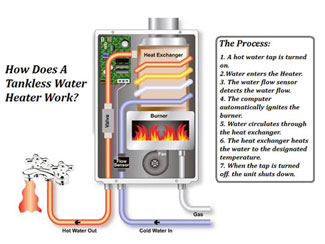How to save $ on hot water

The compact design of the Ruud® ENERGY STAR® qualified tankless gas hot water heater easily fits into a corner of the garage.
We’ve all had that moment of panic when the water in the shower or bathtub faucet suddenly runs cold. When was the last time the water heater was replaced? How much will it cost, and how long will the household be without hot water until a new one can be installed? Usually this happens on a Sunday, or worse yet, while company is visiting.
Tankless water heaters have become more affordable, and ENERGY STAR® models are available that are up to 34% more energy efficient than their tank counterparts, depending on household water usage.
It’s far more efficient to only heat water as you use it, rather than storing it in a tank on a typical water heater, which, over time, can rust or leak. While they cost a little more than tank water heaters initially, they more than pay for themselves through the energy savings they provide over time. The U.S. Department of Energy estimates gas-fired tankless heaters save an average of $108 in energy costs per year over their traditional tank counterparts, while electric tankless heaters save $44 per year.
These heaters also save space with a compact design, can last up to twice as long as tank water heaters, and are better for the environment because a rusty tank doesn’t end up in the landfill. Also, the lower CO2 emissions contribute to cleaner air and a healthier environment.
Here’s how tankless hot water heaters work:
- No storage tank required – water is heated only as needed
- Cold water travels through a pipe to the tankless water heater to be heated
- When a hot water tap is opened in the house, water is heated instantly
- Tankless water heaters can deliver a constant supply of hot water. The ones we install in the homes we build deliver 9.4 gallons per minute, more than enough to keep 2 showers going simultaneously.

Source: heater.dynaping.com/gas-water-heater-diagram
Benefits include:
- Smaller space-saving size
- Gas powered
- Can integrate into smart home setups to be controlled remotely (or by mobile apps that manage appliances, security systems and thermostats)
- Easier to transport (less bulky) and install
- Save up to 20% on your water heating bill
- They never run out of hot water
- Last longer than tank heaters
- Heat water more efficiently
- No risk of flooding or leaking
Tankless water heaters do require some maintenance, though how often depends on the water in your area. Manufacturers should provide more detailed information in the owner’s manual, but the basics can be found here.
We install both Ruud® and Rinaii® ENERGY STAR® condensing tankless water heaters in the homes we build, and according to our plumber, Brian Sarkinen with Homola Plumbing, both brands are easy to install in new homes and perform equally well. Products with the ENERGY STAR® label are the most energy efficient choices you can make as a consumer.
Because there’s no limit to your hot water, a tankless water heater makes life easier. Many family households take multiple showers a day – often one after another – as well as running the laundry and dishwasher. When you go tankless, this is no longer a mad competition over who gets to go first. Everybody wins.



